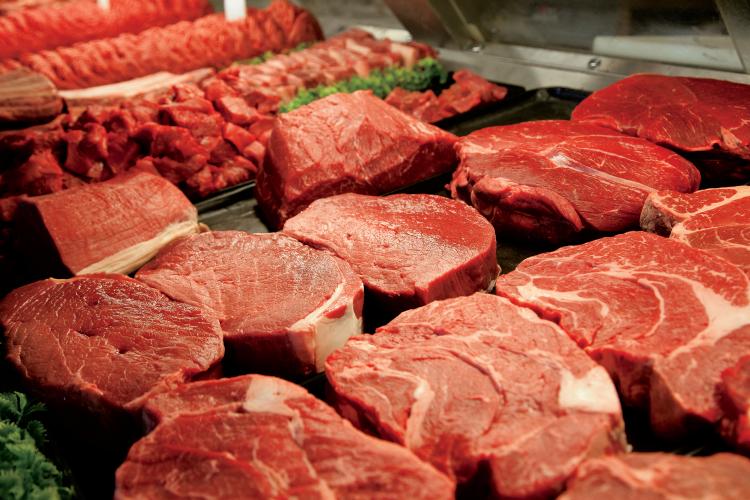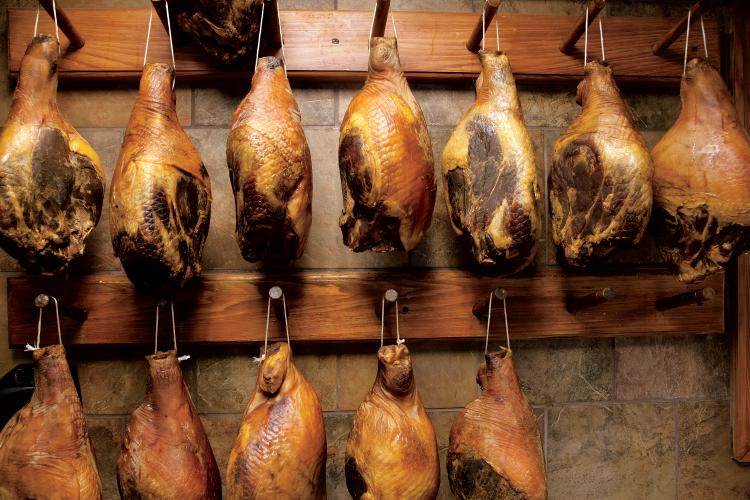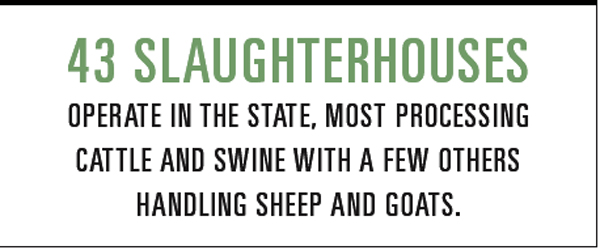Home > Georgia > Georgia Crops & Livestock > Processing Plants Provide Certified Meat for Georgia and Other States
Processing Plants Provide Certified Meat for Georgia and Other States

M&T Meats opened its doors in 1963, processing one or two hogs a week to provide sausage, bacon and ham for neighbors in its Hawkinsville community.
The business today has 24 full-time employees who process 40-60 hogs a week for its retail store, and M&T is preparing to launch an online business. Owner Phil Mathis predicts that the company’s pork sales will double during the first year M&T is online.
“We’ve built a strong reputation in Georgia for 50 years, with 70 percent of customers driving to the M&T store from outside our Pulaski County area,” Mathis says. “Several of those out-of-town customers are actually from out of state.”
Mathis says all pigs slaughtered at M&T are raised in Georgia. The company processes twice a week.
“We also import certified Angus beef to sell in our store, but all pork that we sell is from hogs we slaughter on site,” he says. “By the way, sanitation is top priority at our facility. My employees say I am obsessive-compulsive about sanitation. I take that as a compliment.”
$3 Billion Impact
The meat industry contributes more than $3 billion annually to Georgia’s agricultural economy. Forty-three slaughterhouses operate in the state, most processing cattle and swine, though a handful also deal with sheep and goats.
“Our plant runs five days a week, slaughtering about 10 cows and 200-300 hogs in that time,” says James McAfee, who co-owns McAfee Packing Company in Wrightsville with his brother, John. “The meat is sold at our retail store to give customers the freshest cuts of ground beef, steaks, sausage, bacon and hams. We get animals from two local livestock dealers who both live within 20 miles of our facility.”
Meanwhile, Augusta-based FPL Food LLC is one of the largest privately owned processors of fresh beef products in the United States. The company has 800 employees in four facilities, and processes 5,000 head of cattle weekly.
“We also recently acquired and now operate a 1,061-acre farm in southeast Georgia that will feed 8,000 head of cattle annually,” says Steve Hixon, director of marketing for FPL Food. “We export beef worldwide, and our presence in southeast Georgia supports many local and regional cattle farmers.”

Every Animal Is Examined
Glen Echols, director of the Georgia Department of Agriculture’s Meat Inspection Section, says the meat-processing industry is well regulated throughout the state. A certified inspector must be present whenever a slaughter takes place at any processing site in Georgia – except for one scenario.
“In establishments where they don’t end up selling their meat products, an inspector will not be present. Those are places where a farmer might slaughter a hog for his own use, or for family members or friends,” Echols says. “Those farmers can slaughter, process, package and wrap the meat, but each package must be marked ‘Not for Sale.’”
Echols says in each plant where meat is processed for eventual sale, an inspector examines every animal while it is alive in a holding pen, then each animal’s carcass is inspected one more time following the slaughter.
“We look at critical lymph nodes, organs and tissues to make sure every animal is free of disease,” he says. “Then once the packages of meat are wrapped, every package must bear a Georgia mark of inspection if that package will be sold only within Georgia’s boundaries. However, if a processing plant is allowed to sell across state lines, then each meat package will bear a federal USDA mark of inspection. Our ag department can also do inspections for the USDA – Georgia is one of nine states where that is allowed.”

Humane Handling
Another part of the overall meat process is to check that declared weights are correct on package labels. Echols says inspectors arbitrarily weigh packages to ensure, for example, that a 10-pound package of meat actually weighs 10 pounds.
“Inspectors also verify that all animals are handled humanely during the slaughter process,” he says. “Animals must be moved from holding pen to the plant in a humane manner, and the animals must be rendered instantly unconscious just prior to slaughter so that they won’t experience any pain. The Meat Inspection Section of the ag department is very thorough. Our quest is for every processed package of meat from Georgia to be entirely safe for consumers.”




[…] farmflavor.com/georgia/georgia-crop… […]
Where can i get my hogs processed and packaged for sell with my farm label so i can sell local stores, , on line, delivery, or pick up..
The new business is located in Mitchell, co. .. addressv : 928 whigham road, pelham, Ga.